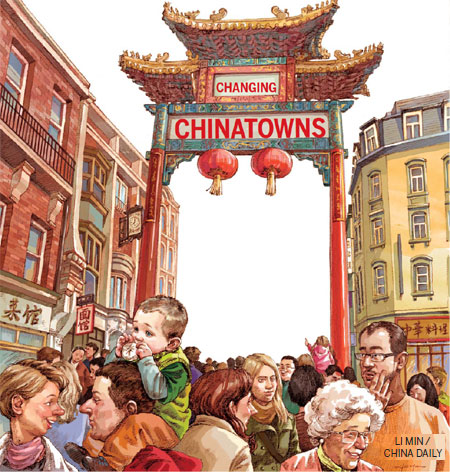Changing Chinatowns
Updated: 2012-11-16 08:48
By Cecily Liu (China Daily)
|
||||||||

Chinatowns in Europe reinvent themselves to stay relevant to migrants, locals
Times are changing and so are the Chinatowns across the world. Starting off as ordinary trading outposts that attempted to satisfy to the culinary needs of overseas Chinese communities, these towns have evolved to become major soft power assets and representative symbols of the modern and resurgent China.
No one knows it better than Kelly Su, who is having the time of her life. The 18-year-old music teacher at a Chinese community center in Liver pool, UK, not only enjoys the comfort of financial freedom but also finds enough time to pursue her favorite passion of strumming yangqin, a Chinese stringed musical instrument.
"When I finished high school this summer, I first thought of going to university. But I decided to be a teacher at Pagoda Arts as I felt it would better suit my music career," she says. Playing yangqin is her unique way of connecting with her roots with China.
|
||||
For most of the immigrants from China to the UK, the Chinatown in Liverpool was not just a second home where they could find familiar people, food and culture. It was also an extended community that offered help and solutions to most of the major problems faced by the new immigrants.
"I couldn't speak any English, my classmates teased me and hid my things. Back then, I dreamed about going back to China every day," Su says.
Without the financial means to rent a house of their own, Su, her mother and brother stayed with relatives while her father worked in Sheffield, a city about 80 miles east of Liverpool.
"My father used to come home every day at about midnight and rarely spent any time with the family. Life was a constant struggle," she says.
Though her work at Pagoda Arts often entails long hours, particularly during school-term breaks, Su is not complaining.
"I realized very early on that there is no substitute to hard work especially if you want to be successful. For me it was also imperative, as I did not want to be trapped in the catering business. I wanted to do something different," she says.
Recollecting the interactions she had with the community leaders in Chinatown, Su says that the unanimous opinion of most of them was that she should learn Mandarin at the local language school.
"My parents have asked me to study Mandarin so that I can find a good job. I believe them because I can see China has become a rising power internationally, and I've been invited to give talks on China in local high schools," she says.

 Relief reaches isolated village
Relief reaches isolated village
 Rainfall poses new threats to quake-hit region
Rainfall poses new threats to quake-hit region
 Funerals begin for Boston bombing victims
Funerals begin for Boston bombing victims
 Quake takeaway from China's Air Force
Quake takeaway from China's Air Force
 Obama celebrates young inventors at science fair
Obama celebrates young inventors at science fair
 Earth Day marked around the world
Earth Day marked around the world
 Volunteer team helping students find sense of normalcy
Volunteer team helping students find sense of normalcy
 Ethnic groups quick to join rescue efforts
Ethnic groups quick to join rescue efforts
Most Viewed
Editor's Picks

|

|

|

|

|

|
Today's Top News
Chinese fleet drives out Japan's boats from Diaoyu
Health new priority for quake zone
Inspired by Guan, more Chinese pick up golf
Russia criticizes US reports on human rights
China, ROK criticize visits to shrine
Sino-US shared interests emphasized
China 'aims to share its dream with world'
Chinese president appoints 5 new ambassadors
US Weekly

|

|










